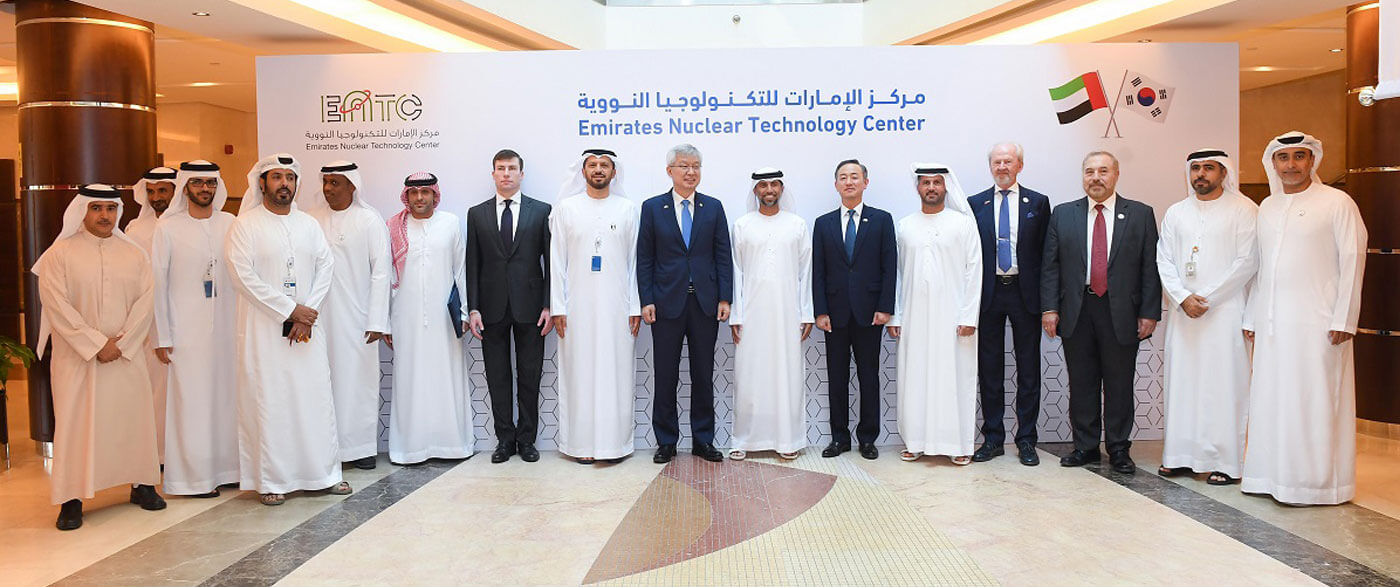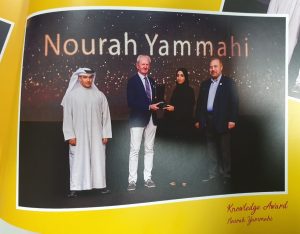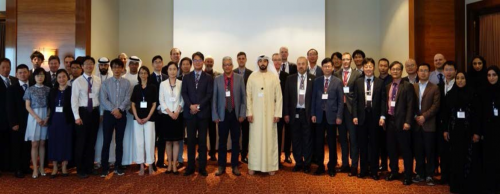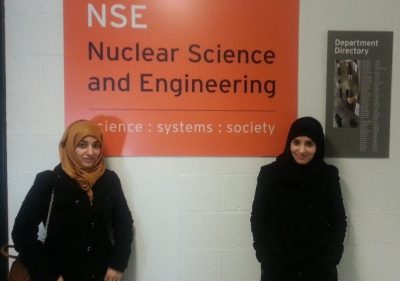
The UAE Ministry of Energy and Industry opened the Emirates Nuclear Technology Center, at Khalifa University’s Sas Al Nakhl Campus in Abu Dhabi, UAE, to support the long-term sustainability of the UAE Peaceful Nuclear Energy Program by creating a dedicated innovation hub for peaceful nuclear technologies.
A Memorandum of Understanding (MoU) was exchanged by His Excellency Suhail Bin Mohammed Faraj Faris Al Mazrouei, UAE Minister of Energy and Industry, and His Excellency Lee Taeho, Second Vice Minister of Foreign Affairs, Republic of Korea, during the opening ceremony, attended by His Excellency Engineer Mohamed Al Hammadi, Chief Executive Officer of ENEC, Christer Viktorsson Director General of the Federal Authority of Nuclear Regulation (FANR), Dr. Arif Sultan Al Hammadi Executive Vice President of Khalifa University, and senior officials from all five entities.
The MoU between the UAE MoEI and the Ministry of Science, and Information and Communications Technology of Korea, under the UAE-Korea Consultation Committee on Nuclear Technology, outlines the framework of cooperation on research projects between the center’s relevant partners.
The Emirates Nuclear Technology Center will engage in research projects designed and approved by ENEC and FANR, and will be conducted by students, academics and researchers from Khalifa University. The Center’s initial research projects will focus on three areas – nuclear safety and systems, nuclear materials science and chemistry, and radiation safety in the environment.
Through the MoU, the ENTC will benefit from sharing of knowledge and expertise from the Korean nuclear energy industry, which has been operating for over 40 years, along with experience in developing nuclear research reactors.
“It is my pleasure to launch the Emirates Nuclear Technology Centre in Abu Dhabi, which is an outcome of our collaborative approach with our South Korean government counterparts and all UAE nuclear stakeholders, who are working to further Nuclear Science & Technology Research and Development. Investing in research and innovation are prerequisites for the long-term success of the UAE’s peaceful nuclear energy industry. It will further position the UAE as an international role model for the development of a peaceful nuclear energy program by building UAE National capabilities and conducting industry-leading research on radiation safety and nuclear energy technologies,” said His Excellency Suhail Al Mazrouei.
“Within the frame of the High-Level Consultation on Nuclear Cooperation, we and our UAE partner are expanding areas of cooperation in the Barakah Nuclear Energy Plant construction and operations, new nuclear energy project in third countries, nuclear R&D, and safety regulations. I believe that the MoU on nuclear energy and R&D cooperation will serve as a catalyst that will further accelerate our bilateral nuclear energy cooperation”, said His Excellency Lee Taeho,.
H.E. Eng. Mohamed Al Hammadi, CEO of ENEC, said: “We are delighted to be part of this initiative to establish the Emirates Nuclear Technology Center. As the UAE’s emerging peaceful nuclear energy industry continues to grow and develop, collaboration and cooperation between academia and industry will allow us to ensure the long-term sustainability of the UAE Peaceful Nuclear Energy Program, as well as enhancing our global competitiveness and high standards of safety. Through its projects and research the Center will provide talented UAE Nationals with the opportunity to work alongside international experts in conducting cutting-edge research, thereby developing their skills and capabilities within the field of peaceful nuclear energy.”
Dr Arif Sultan Al Hammadi, Executive Vice-President, Khalifa University of Science and Technology, said: “We are delighted to join the official launch of the Emirates Nuclear Technology Center (ENTC), hosted on our campus, in collaboration with our stakeholders including our partners ENEC and FANR. The ENTC reflects another strong commitment from Khalifa University to contribute to enhancing the UAE’s nuclear technology research capability and support our key stakeholder’s goals for the delivery of safe, clean and efficient nuclear technology to meet the UAE 2030 vision. The center will significantly optimize the multidisciplinary capabilities through Khalifa University’s diverse community of faculty and researchers to meet the national objectives.”
“We are delighted to join our national and international stakeholders in launching the Emirates Nuclear Technology Centre. Investing in research and innovation in nuclear technologies is indispensable to ensure the sustainability of the nuclear program. We will work closely with our partners to identify priority areas, focus on strategic nuclear sector research, ensure continuity of projects and provide support to national and international initiatives in line with FANR’s R & D Policy, which was launched in 2017. FANR will support the mandate of the new center by utilizing its Research and Development Program. FANR’s Research and Development Program aims to develop and attract Emiratis by providing opportunities for postgraduate education and research in the nuclear field. It also aims to ensure sound technical basis for all regulatory activities, mitigate risks related to safety, security and safeguards in the UAE nuclear sector,” said Christer Viktorsson, Director-General of the Federal Authority for Nuclear Regulation (FANR) in the UAE.
The establishment of the Emirates Nuclear Technology Center will cement the UAE’s position as an international role model for the development of a new peaceful nuclear energy projects around the globe. Innovation and continuous development are essential to the sustainability and long-term success of the UAE’s peaceful nuclear energy industry, as well as the UAE’s ongoing transition to a knowledge-based economy and society.
The MoU comes at a pivotal time for ENEC, with the 4 Units of Barakah Nuclear Energy Plant more than 93% complete. Unit 4 is over 82% complete, Unit 3 is more than 91% and Unit 2 is more than 95%. Unit 1 construction has been completed and is currently undergoing operational readiness preparations pending regulatory approval and receipt of the Operating License for Unit 1 from FANR, anticipated in early 2020.
After the launch of ENTC and the MoU signing, His Excellency Suhail Al Mazroui, His Excellency Lee Taeho and members of the official delegation from Korea, ENEC, and FANR along with Khalifa University senior management team, faculty members and researchers toured the research facility.
Later, delegation members from the two countries attended the second meeting of the ‘UAE-Korea high-level consultations on nuclear cooperation’.
Dr. Yacine Addad, Associate Professor of Nuclear Engineering and Theme-1 lead of the Emirates Nuclear Technology Center (ENTC), is leading collaborative research project with IRSN, France and FANR, UAE. The project is being funded by the Federal Authority for the Nuclear Regulation, UAE.
The aim of this research program is to enhance the capabilities of the UAE to simulate radionuclides dispersion in marine, atmospheric and continental environments taking account for regional and local features. Since UAE has started the nuclear program by constructing four nuclear power plants, UAE is putting intensive efforts in increasing human capability on nuclear safety. This objective is in-line with the Abu Dhabi Economic Vision 2030 as it serves the purpose of the development of a highly-skilled, science-oriented, workforce of UAE Nationals, and it lays the foundations for research & development in the field of nuclear energy safe usage, which not only supports the Plan’s goal of diversification of the Emirate’s economy but also minimizes the impact of this newly adopted sustainable energy source on the natural environment.
The safe, reliable, and economic operation of the UAE’s nuclear power plants at Barakah has been at the heart of the nation’s nuclear energy program since its inception in 2008 with the publication of the “UAE Policy on the Peaceful Use of Nuclear Energy” document. Following the events at Fukushima, Accident Tolerant Fuels (ATFs) became a focus within the nuclear fuel R&D community. Using ATFs in the existing APR1400 Barakah reactors would help endure loss of active cooling in the reactor core for a considerably longer period of time, and therefore would be safer, than the current fuel system while maintaining or improving performance during normal operations. To achieve this goal, many assessments will be needed including neutronics, thermal-hydraulic, thermo-mechanical/chemical, and fuel performance analyses for several candidate ATF concepts. In performing final assessments, the “do no harm” principle will be observed, meaning that the selected ATF concepts must, under all operating conditions, perform as well as or better than the current fuel system used in the APR1400 reactor core.
Recently, a KU team lead by Dr. Saeed Alameri and 6 more faculty members, along with 3 external collaborators from MIT, KAIST and University of Manchester won a high value grant of the Ministry of Education Collaborative Research Program Grant 2019 in which just 4 awards were selected out of 238 proposals in the whole country. The topic is about (Evaluation of Using Accident Tolerant Fuel Concepts in APR1400) with a total amount of almost AED 7M. The following are the main objectives of this research:
ATLAS (Advanced Thermal-hydraulic Test Loop for Accident Simulation) facility has been constructed to develop new safety concepts and verify their performance in APR1400. Valuable large-scale integral effect test (IET) data were produced and effectively utilized for domestic standard program (DSP) and International standard program (ISP). ATLAS has been recognized as one of the important IET facilities worldwide since the ISP-50 was successfully completed in 2011, where 14 organizations from 11 OECD countries participated.
OECD/NEA ATLAS project has been initiated in 2014 for further international cooperation to deal with common safety issues relevant to PWR, and proposed five topics related to beyond design basis accidents. UAE is participating in the project to increase local human capability on safety analysis. To this end, FANR and Khalifa University are planning to cooperate in the UAE participation to the ATLAS project, which will consist in conducting numerical simulations, using RELAP5; the blind pre-test and post-test simulations. The blind pre-tests rely on only specification of experiment given by the operating agency. The post-test simulation can be performed after acquiring experiment data from the operating agency.
At the start of the project, the Operating Agency (OA), KAERI, has provided the steady-state input deck of RELAP5/MOD3 for ATLAS facility to all participants. Then each participating agency has to generate its own transient input in accordance with proposed experiment scenarios. Although this might seem a trivial exercise at first glance, the generation of transient input is strongly dependant on experience and know-how level of the user groups. The given steady-state inputs also need to be modified and some component have to be remodelled to cope with the newly proposed scenario. For this reason, previous similar projects revealed that each participating agency come up with different results even though they have been using the same safety analysis code.
Preparation of input, running simulation, debugging process, interpretation of results and all lessons learned will be consolidated as a training material for increasing local human capability on safety analysis.
Additionally, at least one local component will be selected from each proposed scenario to investigate the detailed thermal hydraulic phenomena using the computational fluid dynamics (CFD) approach. Simulation results from RELAP5 will then be compared with both; the CFD predictions and the experimental data from ATLAS facility.
Reactor containment buldings (RCBs) as the last barrier to the release of radioactive materials play a critical role in the nuclear power plants (NPPs). Thus, the integrity of RCBs has been studied as one of the projects in the ENTC.
Several MSc students in Nuclear Engineering have participated in the project and after graduation they are actively working on the safety and security areas of NPPs at FANR and ENC/NAWAH. Sara Al Hanaee, one of the MSc graduates, completed her MSc Thesis titled ‘Effect of aging on ultimate pressure capacity of nuclear reactor containment building, which was published in a journal named ‘Nuclear Engineering and Design’. She was one of the three winners of the competition at the 10th anniversary of the World Institute for Nuclear Security (WINS) operation in 2018. Also, while working at FANR, she was a winner of FANR Annual Award “Exceptional Employee Award” in 2019.

Nourah Alyammahi is a full-time MSc student in nuclear engineering under the supervision of Assist. Prof. Ho Joon Yoon. She is also a FANR nuclear safety assessment engineer, was selected to participate in the ATLAS-2 Project. Her MSc thesis is to conduct the numerical analysis using one of the thermal hydraulic safety analysis code, RELAP 5, whilst conducting experiments and tests developed by the Korean Atomic Energy Research Institute. She participated in every test and experiment over the last two years and put UAE on the global stage regarding thermal hydraulic safety analysis by presenting Five of her research findings at ATLAS Project Review Meetings. On each occasion, the Emirati demonstrated vast improvements in her skills and knowledge, and in her ability to convey technical analysis to a highly-skilled and knowledgeable audience. In May 2019 She also delivered a paper on RELAP 5 simulation of intermediate break loss of coolant accident at the International Congress on Advances in Nuclear Power (ICAPP) in France.

The 2nd Meeting of the Program Review Group and Management Board of the OECD/NEA ATLAS Phase 2 Project was hosted by UAE. ATLAS stands for Advanced Thermal-hydraulic Test Loop for Accident Simulation (ATLAS) Project. The project is led by The Nuclear Energy Agency framework of the Organization for Economic Co-operation and Development . The ATLAS project is aimed at topics of high safety relevance for both existing and future nuclear power plants. The main objective of the NEA ATLAS Project is to provide experimental data for resolving key LWR thermal-hydraulics safety issues related to multiple high-risk failures and highlighted in particular from the Fukushima Daiichi nuclear power plant accident, by using the ATLAS facility at KAERI. UAE has participated in the ATLAS project since 2014. The UAE research team consisting of KU, FANR, and ENEC started to receive recognition from an international expert group in the nuclear safety field and hosted one of the important meetings in Abu Dhabi. The international expert groups participated from Belgium (BelV), China (SPICRI, CGNPC, NPIC), Czech (UJV), France (CEA, EDF), Germany (GRS, Framatome), Spain (CSN), Switzerland (PSI), UAE (FANR, ENEC, KU), USA (NRC), Korea (KAERI, KINS, KEPCO E&C), Japan (JAEA).

Students spoke at the American Nuclear Society student conference held at the Massachusetts Institute of Technology (MIT)
In August 2013, two Khalifa University Master’s students in Nuclear Engineering presented their initial research findings at the 2013 American Nuclear Society Student Conference held at MIT.
Students Amal Salah Bin Hraiz and Mouza Abdulla Alhebsi presented their research papers to over 600 students and professionals who were in attendance at the conference, including a large number of international representatives. Their papers were selected for the conference by a panel of reviewers from ANS who assessed hundreds of submissions from students around the world.
Both students are currently receiving full scholarships from the Emirates Nuclear Energy Corporation (ENEC) as part of its Energy Pioneers program, in order to pursue their masters. ENEC also fully funded their trip to MIT.
Amal’s paper was titled “3D Full Core Calculations of Westinghouse AP1000 Using WIMS/PARCS/SNAP Code System,” and Mouza Abdulla Alhebsi paper was titled “Numerical Investigation on the Dissolution of a Light Gas Stratification in a Safety Containment Model”. Both papers were well received by the audience who showed a great deal of interest in the research.
Amal is currently working on her M.Sc. research in the area of modeling and simulation of nuclear reactors while Mouza is working in the area of Computational Fluid Dynamics (CFD) applications in nuclear reactor safety analysis. The students were under the supervision of Khalifa University’s Nuclear Engineering faculty members, Dr. Mohamed Elsawi, and Dr. Yacine Addad respectively.
The conference presented both women with the opportunity to learn about the latest nuclear developments from industry, research, and academia. It also gave them the opportunity to listen to their peer’s research in a variety of subjects related to nuclear engineering including law, nuclear medicine, quantum physics, computer science and thermodynamics.
“We are very pleased that our students had the opportunity to present their work at such an important international conference, in front of their peers, and industry and academic leaders,” said Dr. Philip Beeley, Professor and Program Chair, Nuclear Engineering at Khalifa University. “The safe and secure use of nuclear energy is one of the main focuses of the government of the UAE at the moment; in fact the country just broke ground for the construction of its second nuclear reactor, so to see our students focused on such an important endeavor is very encouraging for the future of the UAE. Khalifa University is dedicated to providing our students with a high quality education, and with ample opportunities to meet with industry and academic leaders, in this way we are helping to build the knowledge economy envisioned by the Abu Dhabi 2030 Vision.”
“We are proud to support such talented and dedicated students and congratulate them both for their hard work and achievements,” said Ahmed Al Mazrouie, Deputy Chief Nuclear Officer of ENEC. “Nuclear energy is an industry of critical importance to the future of our nation – and we need a large, highly trained and determined team of Emirati women and men to lead the industry forward. We look forward to welcoming them both to ENEC when their studies are complete.”